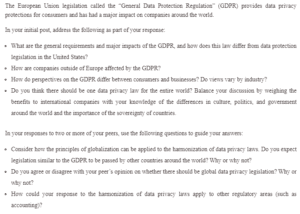General Data Protection Regulation
The General Data Protection Regulation (GDPR) is a European Union regulation that mandates organizations to protect personal data and maintain the privacy rights of all E.U. citizens. GDPR has seven principles for data protection and responsibility: lawfulness, justice and openness, purpose restriction, data classification, correctness, storage constraint, security and secrecy, and responsibility. This regulation provides consumers more control over their personal information, such as accessing it and deleting it.
“The California Consumer Privacy Act 2018 (CCPA) is the first comprehensive law in the area of privacy and personal information in the U.S.” (Walugembe, 2019) and is similar to GDPR. However, unlike the CCPA, which requires a “consumer” to be a California resident, GDPR does not need the user to be an E.U. citizen or resident. Also, GDPR expands its jurisdiction to organizations that do not have a physical presence in the E.U. but sell products and services or monitor the behavior of E.U. citizens. Lastly, the GDPR delegated enforcement authority to national supervisory bodies.
Currently, GDPR is not global, but it “imposes obligations onto organizations anywhere, as long as they target or collect data related to people in the E.U.” (GDPR, 2022). GDPR expands its jurisdiction to organizations that do not have a physical presence in the E.U. but sell products and services or analyze the conduct of E.U. citizens.
For consumers, The GDPR will “guarantee tech users certain rights, including control and access to their data, and even the right to request their data deleted” (GDPR, 2022). It will restore trust in the internet to consumers. As for organizations, they will utilize security tools such as encryption to minimize data breaches. Also, GDPR rules and regulations may be overwhelming and challenging to businesses.
Each country should construct a strong privacy law like the GDPR. It would be convenient for a data privacy law to be in place for the entire world. However, it might be impossible to turn this into reality. Each country has its differences. It would be challenging for all countries to agree on a single data privacy law. These differences include political government types (communism, socialist, capitalist, etc.) and different cultures; therefore, values and beliefs will not align with one another.
References
GDPR. (2022). FAQ. Retrieved from GDPR.edu: https://gdpr.eu/faq/
GDPR. (2022). What Does the GDPR Mean For Business and Consumer Technology Users? Retrieved from GDPR.edu: https://gdpr.eu/what-the-regulation-means-for-everydayinternet-user/
Walugembe, T. (2019). How Do The New Data Protection Laws in the U.S. Compare To GDPR? Retrieved from HewardMills: https://www.hewardmills.com/data-protection-laws-in-the-us/#:~:text=Generally%20the%20CCPA%20and%20the%20GDPR%20are
ORDER A PLAGIARISM-FREE PAPER HERE
We’ll write everything from scratch
Question 
The European Union legislation called the “General Data Protection Regulation” (GDPR) provides data privacy protections for consumers and has had a major impact on companies around the world.

General Data Protection Regulation
In your initial post, address the following as part of your response:
- What are the general requirements and major impacts of the GDPR, and how does this law differ from data protection legislation in the United States?
- How are companies outside of Europe affected by the GDPR?
- How do perspectives on the GDPR differ between consumers and businesses? Do views vary by industry?
- Do you think there should be one data privacy law for the entire world? Balance your discussion by weighing the benefits to international companies with your knowledge of the differences in culture, politics, and government around the world and the importance of the sovereignty of countries.
In your responses to two or more of your peers, use the following questions to guide your answers:
- Consider how the principles of globalization can be applied to the harmonization of data privacy laws. Do you expect legislation similar to the GDPR to be passed by other countries around the world? Why or why not?
- Do you agree or disagree with your peer’s opinion on whether there should be global data privacy legislation? Why or why not?
- How could your response to the harmonization of data privacy laws apply to other regulatory areas (such as accounting)?